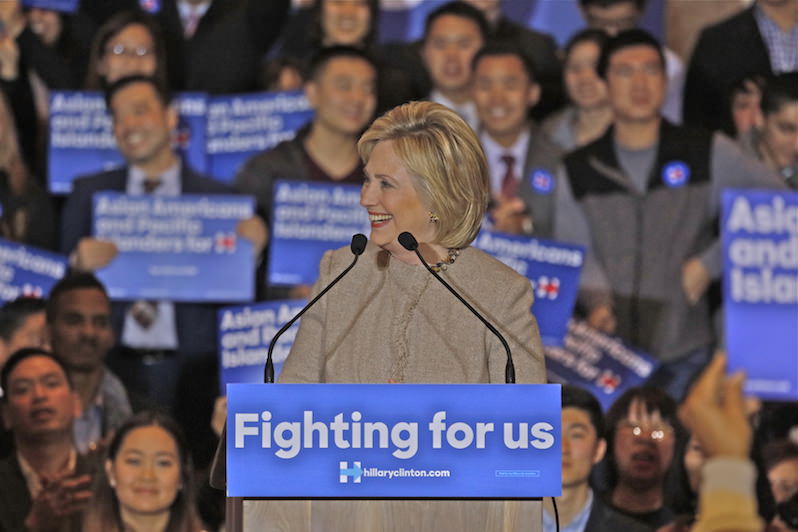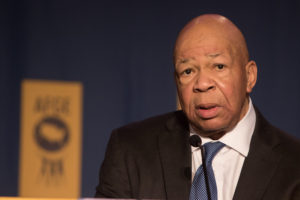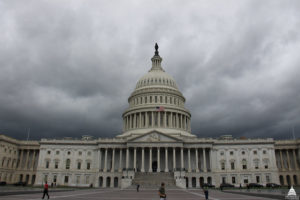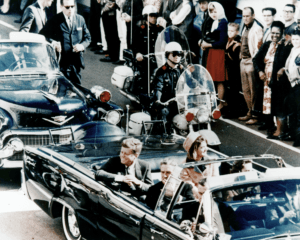Hillary the Hawk: NYT Calls Clinton’s Libyan Intervention, and Her Leadership, Into Question
The New York Times formally endorsed Hillary Clinton for the Democratic Party's nomination, but that stance might seem surprising after a close read of the paper's in-depth investigation of her assured, yet ultimately failed, strategy for compulsory regime change in Libya five years ago. Candidate Hillary Clinton speaks to a group in San Gabriel, Calif., on Jan. 7. (Joseph Sohm / Shutterstock)
Candidate Hillary Clinton speaks to a group in San Gabriel, Calif., on Jan. 7. (Joseph Sohm / Shutterstock)
The New York Times last month formally endorsed Hillary Clinton for the Democratic Party’s nomination, but that stance might seem surprising after a close read of the paper’s in-depth, fresh investigation of then-Secretary of State Clinton’s assured, yet ultimately failed, strategy for compulsory regime change in Libya five years ago.
Jo Becker and Scott Shane set the tone for their first piece, published in Sunday’s edition, in the Times’ three-part series about Libya’s evolution by noting how that situation wasn’t the first time Clinton had pushed for the U.S. to become involved in an overseas offensive in a Muslim country at an immeasurable cost.
The authors also suggested that Clinton herself paid a high price for that first foray she sponsored — from her perch in the Senate when she voted in favor of the Iraq invasion — by losing her first bid for the White House in 2008.
And it was once again her action-oriented approach that resulted in turmoil for millions of people in 2011, as Becker and Shane detail in their survey:
From the earliest days of the Libya debate, Mrs. Clinton was a diligent student and unrelenting inquisitor, absorbing fat briefing books, inviting dissenting views from subordinates, studying foreign counterparts to learn how to win them over. She was a pragmatist, willing to improvise — to try the bank-shot solution. But above all, in the view of many who have watched her up close, her record on Libya illustrates how, facing a national-security or foreign-policy quandary, she was inclined to act — in marked contrast to Mr. Obama’s more reticent approach.
Anne-Marie Slaughter, her director of policy planning at the State Department, notes that in conversation and in her memoir, Mrs. Clinton repeatedly speaks of wanting to be “caught trying.” In other words, she would rather be criticized for what she has done than for having done nothing at all.
“She’s very careful and reflective,” Ms. Slaughter said. “But when the choice is between action and inaction, and you’ve got risks in either direction, which you often do, she’d rather be caught trying.”
The New York Times’s examination of the intervention offers a detailed accounting of how Mrs. Clinton’s deep belief in America’s power to do good in the world ran aground in a tribal country with no functioning government, rival factions and a staggering quantity of arms. The Times interviewed more than 50 American, Libyan and European officials, including many of the principal actors. Virtually all agreed to comment on the record. They expressed regret, frustration and in some cases bewilderment about what went wrong and what might have been done differently.
Was the mistake the decision to intervene in the first place, or the mission creep from protecting civilians to ousting a dictator, or the failure to send a peacekeeping force in the aftermath?
Mrs. Clinton declined to be interviewed. But in public, she has said it is “too soon to tell” how things will turn out in Libya and has called for a more interventionist approach in Syria.
Libya’s descent into chaos began with a rushed decision to go to war, made in what one top official called a “shadow of uncertainty” as to Colonel Qaddafi’s intentions. The mission inexorably evolved even as Mrs. Clinton foresaw some of the hazards of toppling another Middle Eastern strongman. She pressed for a secret American program that supplied arms to rebel militias, an effort never before confirmed.
Only after Colonel Qaddafi fell and what one American diplomat called “the endorphins of revolution” faded did it become clear that Libya’s new leaders were unequal to the task of unifying the country, and that the elections Mrs. Clinton and President Obama pointed to as proof of success only deepened Libya’s divisions.
Now Libya, with a population smaller than that of Tennessee, poses an outsize security threat to the region and beyond, calling into question whether the intervention prevented a humanitarian catastrophe or merely helped create one of a different kind.
An incomplete review of the disaster that awaited post-Gadhafi Libya includes the deaths of more than 4,000 people, the establishment of Islamic State’s camp on the nation’s shore, a sharp spike in human trafficking and resulting refugee exodus, and the incident that became fodder for one of the GOP’s biggest anti-Clinton crusades — the Sept. 11, 2012, attack on the American Embassy in Benghazi.
Whether keeping Libya’s deposed dictator in power longer would have best served Libyans in the long run is an impossible call to make with certainty. But Clinton’s opponents, including Sen. Bernie Sanders, might think they know better, and convincing American voters otherwise will probably be among her biggest challenges in the final stretch of her presidential campaign.
–Posted by Kasia Anderson
Your support matters…Independent journalism is under threat and overshadowed by heavily funded mainstream media.
You can help level the playing field. Become a member.
Your tax-deductible contribution keeps us digging beneath the headlines to give you thought-provoking, investigative reporting and analysis that unearths what's really happening- without compromise.
Give today to support our courageous, independent journalists.






You need to be a supporter to comment.
There are currently no responses to this article.
Be the first to respond.